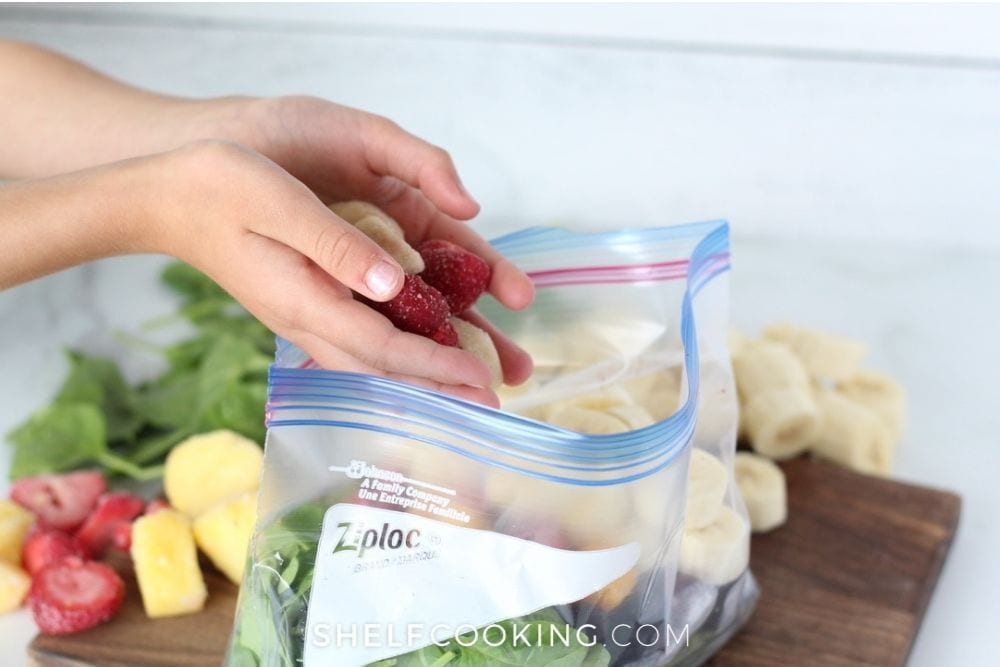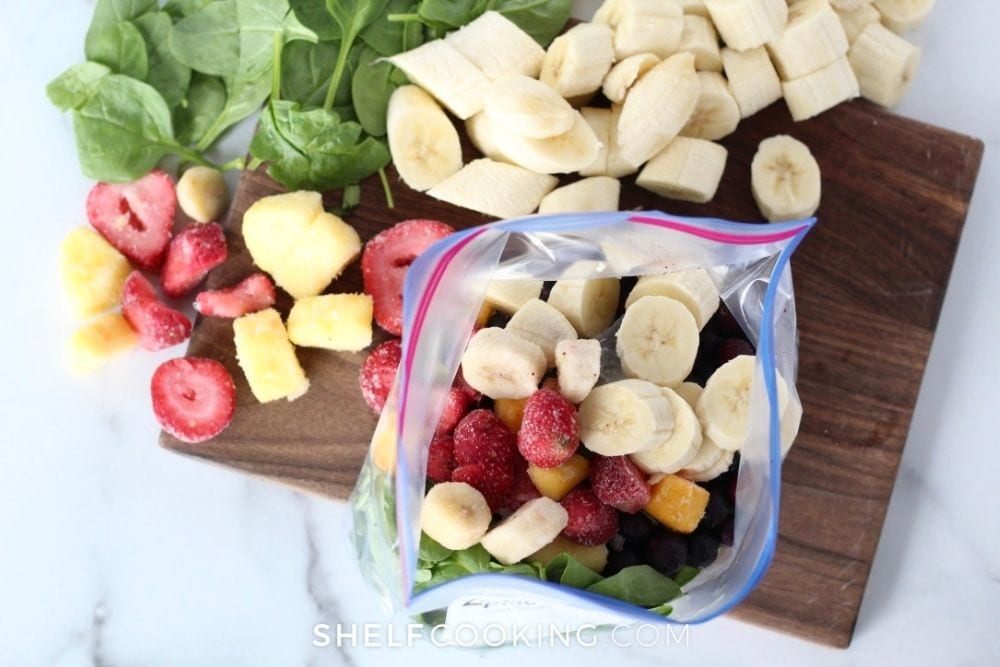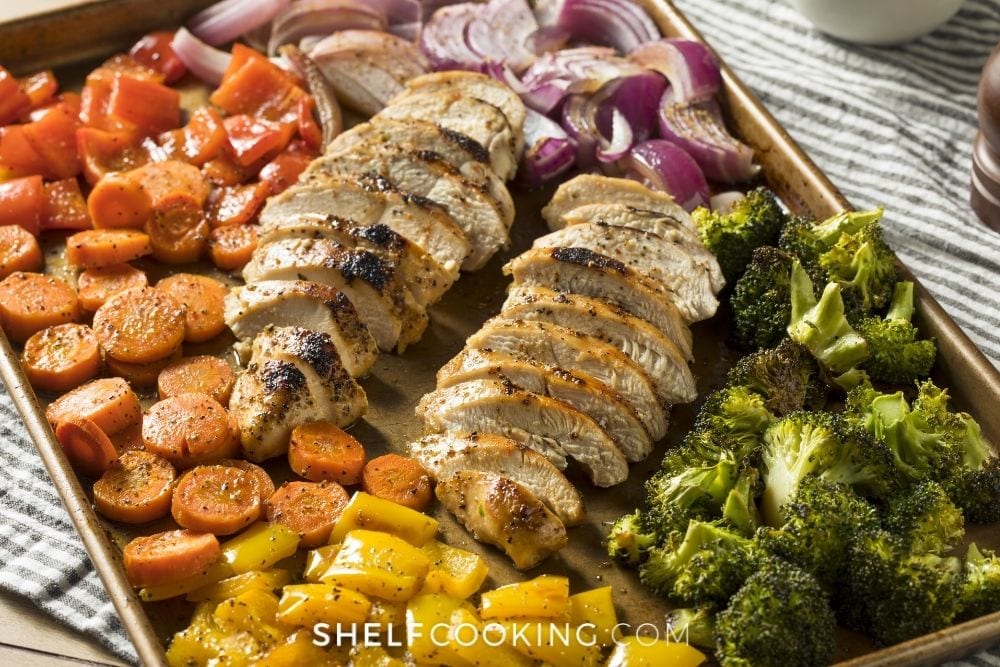Setting a grocery budget can be a challenge in and of itself; now add in a family member with food allergies and special dietary restrictions. Is that grocery budget still possible? Ab-so-lute-ly! We’re showing you many ways to stick to your budget, even when making special dietary modifications.

Whether you're following a vegan diet, sticking to keto, or just striving to eat fewer processed foods, these practical tips will help you eat better without spending more. Are you ready to learn the secrets?
*Note: When you click the links in this post, we may receive a commission at no extra cost to you.
Dealing with a food allergy or dietary restriction can be stressful and challenging enough. Let’s make it easier on your grocery budget with some shopping tips and tricks!
SETTING YOUR GROCERY BUDGET
Let’s start with the million-dollar question: how much money should you spend on groceries?

Here’s the short answer… My suggested grocery budget is $100 per person per month, starting at $300. (You households with only two people just drew a get-out-of-jail-free card!) $100 per person means exactly that: each person in your house – newborn baby, grade-schooler, teenager, or adult – gets $100 per month.
Some of you may be thinking, “Oh yea, that's totally doable!” Then others are definitely thinking, “What!? Are you kidding me right now? No way will that EVER work.” But before you start freaking out on me, just know that I've been blogging about this and following this rule for years! I've had so many people who have followed my advice, meal planned, shelf cooked, and grocery shopped the frugal way. For them, $100 per person isn't only doable, but it's totally reasonable, too!
However, it won't be reasonable for everybody. You may live in a place where food is crazy expensive (I'm talking to you, Hawaii!). You may live way out in the middle of nowhere and you only have one store within 50 miles that just happens to be crazy expensive. There may be some voracious teens who can basically eat you out of house and home every. single. meal. If this is the case for you, then that's okay! You can adapt for your situation, but the most important thing is you STICK to what number you decide!
The grocery budget comes down to one main thing: consumables. Consumables are things you use regularly and need to replenish on a weekly or monthly basis. Examples of grocery budget items include food, milk, shampoo, sodas, dog or cat food, baby wipes/diapers, formula, shaving cream, zip-lock bags, basic kitchen utensils and baking items, cleaning supplies, medicine that you can buy off the shelf (like headache or cold medicine), makeup, toilet paper, and other toiletries.
HOW TO STAY WITHIN YOUR GROCERY BUDGET

The number one way to stay within an established grocery budget is to become an expert at shelf cooking. One of the primary benefits of shelf cooking is the impact it has on what you’re spending on groceries every month. We really break it down in our shelf cooking post, but let's go over the main points!
WAYS TO STAY ON BUDGET
- Make Frugal Meals – Save your meals that include expensive meats and finer ingredients for the weekend, rather than making them throughout the week.
- Don't Be Wasteful – Use, use again, then reuse again! Don’t throw anything away. There are so many ways to repurpose leftovers into different meals if you’re tired of eating the same over and over.
- Buy Extra When Items are on Sale – As long as your budget allows it! Stock your pantry or freezer with extras for later. Then you can shop your stock of food at home when you need something instead of having to go buy it at full price.
- Shop Around Before You Do Your Shopping – Follow my grocery shopping on a budget tips from this post to learn how to get the most out of your grocery budget.
- Make Extra and Freeze – When you're cooking, make extra and freeze it! It's really simple to double and freeze what you're making. You'll thank me when you have a crazy busy day and forget to set something out for dinner. It's so much easier (and cheaper) than grabbing take out!
- Your Grocery Budget is ONLY for Groceries and Other Consumables – The money that you spend eating out should come from your “other” budget. (That having been said, eating out should happen infrequently, not regularly!)
Pro Tip: Have someone else do your grocery shopping for you! You can use Walmart Grocery Pickup (click on that link and get $10 your first order of $50) and have your groceries loaded into your car for you OR use Instacart and pay for someone to do your grocery shopping and deliver them to your house. Either way, you're sure to save money because you don't have to worry about impulse buys!
ACCOMODATING FOOD ALLERGIES AND DIETARY RESTRICTIONS ON A BUDGET
If someone in your family has special dietary needs, you already know the impact that can have on your grocery budget. Many of the same principles still apply.

BUY GENERIC
When it comes to the shelf cooking staples, like canned goods, grains, and flours, does it matter which brand you buy? The short answer is “no.” Here's why: in most cases, those generic products are manufactured by the same company that puts out the name-brand version. That markup between the two products pays for advertising. So, the next time you're re-stocking your kitchen, here are the items you should always buy generic.
- Flour
- Sugar
- Rice
- Pasta
- Beans
- Spices
- Oatmeal
- Vinegar
- Nuts
- Dried Fruits
- Canned Vegetables
- Canned Soups
- Broth
- Condiments
Switching from name brand to generic can easily save you $20 or more each week. Over the course of a year, that's a TON! Think of all the other things you could do with that whopping $960.
BUY IN SEASON
Buy things in season and freeze! You’ll spend much less on produce when they are in-season rather than in the dead of winter. So stock up while the harvest is plentiful and store the excess for later! Freezing fruits and vegetables when they are in season is a great way to have cheap produce all year long. You can freeze most produce at home without any special equipment. Not only can you freeze it when it's fresh, but you can also freeze produce that is a little past its prime to use in smoothies. (P.S. We've got a whole guide to buying seasonal produce on our Shelf Cooking blog!)

BUY ON SALE AND STOCK UP FOR LATER
This principle is a given, but especially when a beloved specialty item goes on sale – take advantage of sale prices to purchase specialty items. Buy in bulk when you can, especially at stores like Costco. Fun fact: snack foods tend to go on sale right before the start of the school year! So look for great deals and lock in your snacks at the cheaper price.
BUY FROZEN PRODUCE
When you calculate the cost per ounce, you can save as much as 30% by buying frozen fruits and veggies instead of the fresh stuff from the produce section. Buy what's on sale! When it comes to frozen produce, brands really don't matter.
BYPASS CONVENIENT PACKAGING
The markup on “convenience foods” is pretty insane. Those steamable bags of frozen veggies? Crazy expensive. Select cuts of meat? Ridiculously-priced. Pre-chopped fruit? Don't even get us started. Buying whole foods is one of the best ways to make your grocery budget go a whole lot further. Instead of buying chicken tenders, buy the entire chicken and cut it up yourself. You'll get multiple meals out of it!

SHOP DISCOUNT RETAILERS, NOT SPECIALTY STORE
The same box of gluten-free graham crackers can cost significantly more at a specialty store or a Whole Foods than it would at a Sam's Club, Smart & Final, Grocery Outlet or similar discounted retailer. Make sure you are shopping at retailers with low price points so you aren't paying a premium simply for the ambiance of the store atmosphere.
A food allergy or dietary restriction in the family might mean some unique groceries are required. We hope we've shown you that there are plenty of ways to keep your grocery bill low and find ways to cut costs so that dietary restrictions don't mean cause excess expenses at the store!

We have so many more great free resources for you to find savings in the grocery store and in your own kitchen! Check out more Shelf Cooking posts:
- Stretch your grocery budget with these Meatless Monday recipe ideas!
- These kitchen appliances will help save you money in the kitchen!
- How to save MAJORLY by shopping case lot sales.
Let us know if there are any specific dietary restrictions or allergies you are finding a challenge to shop affordably for. We love brainstorming substitution options with you!
